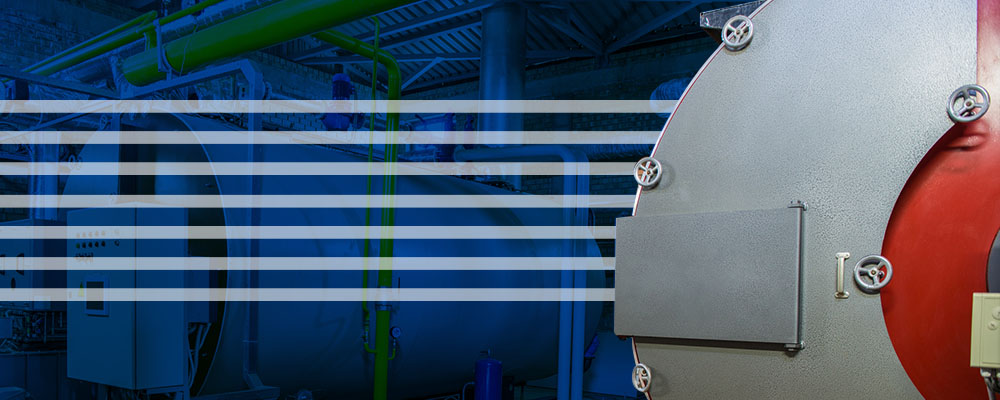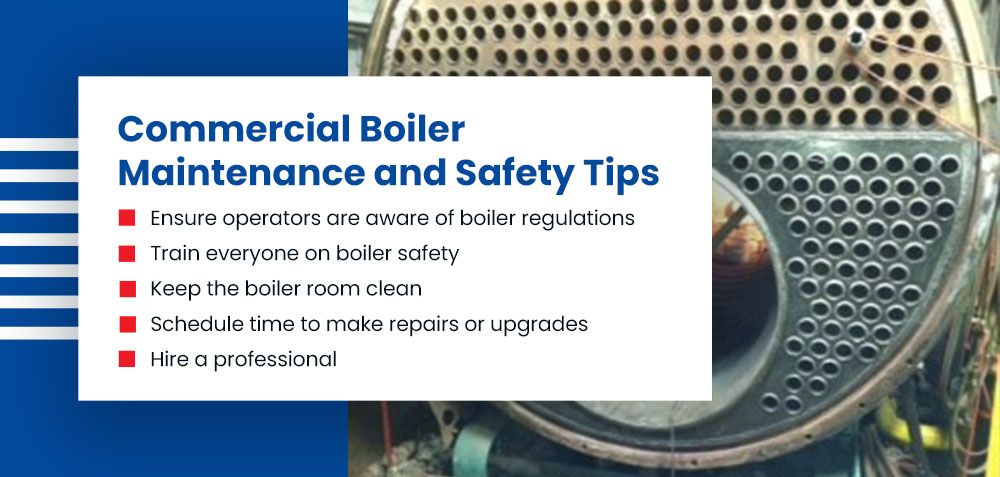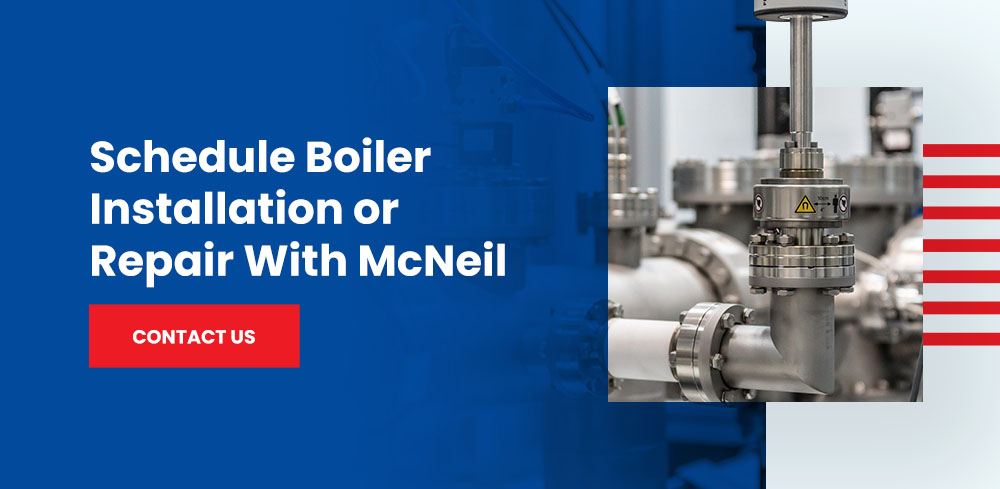How Do Commercial Boilers Work?

A commercial boiler contains water and transfers heat from a fuel source, such as gas, oil or coal, into steam. The steam is piped to a specific location, allowing it to run equipment, sterilize, steam-clean or provide heat. These boilers are essential to transfer heat energy from one place in your business to another, allowing everything to operate efficiently.
Some commercial boilers use an open system, which allows the steam to return to water form and be reused for different functions. Other boilers run on a closed system, meaning they don’t return the steam to water where it can be reused.
Below, you’ll learn more about how industrial boilers work, the types of boilers and other high-pressure steam boiler basics to help you operate your building’s equipment effectively.
Parts of a Commercial Boiler
Generally, commercial boilers contain the same parts and components essential for effective heating. Some of the standard components of a commercial boiler include:
- Burner: The burner is responsible for providing the flames that heat the water in the vessel. The burner helps create a mixture of fuel and oxygen, allowing the fire to burn efficiently and consistently.
- Combustion chamber: This is the area in the boiler where fuel burns to assist with heating the water. The combustion chamber is where the burners are located and is designed as a secure and safe location for the combustion of volatile fuel at high temperatures. Typically, combustion chambers are made from steel, cast iron or other heavy-duty metals.
- Heat exchanger: This vital component transfers the burners’ heat to the water, allowing it to create steam. Heat exchangers are usually made of copper, steel, cast iron or heavy-duty metal.
- Exhaust stack: This component is also called the flue. It consists of a series of pipes that carry exhaust fumes away from your facility’s interior and outside. An exhaust stack must be carefully constructed to ensure toxic fumes, such as carbon monoxide, are safely removed from your facility’s interior.
- Controls: System controls are an essential part of a commercial boiler, allowing you to set the water temperature, internal pressure, ignition, and fuel and air supply mixtures. You can control how often your burner fires, the rate at which your fuel is used and the quality of the fuel and oxygen mixture. The controls have safety features, allowing you to ensure your system stays operational.
All of these components are essential to a boiler, allowing it to operate safely and efficiently within your business. Without one of these components, your boiler couldn’t provide heating or other essential functions to your commercial enterprise.
How a Commercial Boiler Operates
There are different commercial boilers you can use. However, most boilers work similarly, using burning fuel or electricity to create heat and provide a hot water supply to a building. Depending on the type of system, the boiler may produce steam or hot water, which is then circulated in the pipes within a commercial facility.
Electric coils or fuel burners create heat in a boiler, which is transferred to the water from the heat exchanger. The hot water or steam travels through pipes within the building to the designated area. The water or steam enters the radiators of other heating systems in the building to disperse the warmth, allowing you to keep a space at your desired temperature.
The end goal of a commercial boiler is to produce consistent heat within a commercial building, whether it’s an office, medical facility, apartment complex or school.
Commercial Boiler Maintenance and Safety Tips

Remember that boilers contain steam or hot water under high pressure, so boiler maintenance is essential to sustain your boiler’s life span. You must take the proper steps to ensure your boiler stays clean and works correctly.
Hot water or steam leaks can cause significant damage or injuries. In some cases, boilers can explode when not adequately maintained, creating the potential for severe injuries or death.
You can follow some of the tips below to keep your boiler properly maintained:
- Ensure operators are aware of boiler regulations: Boiler operation regulations vary by state. For example, most states require your boiler to be inspected yearly, but some don’t. You should make any rules or regulations available to anyone who comes in contact with the boiler to ensure they follow protocol.
- Train everyone on boiler safety: While boiler explosions are rare, they can still happen. It’s essential to train operators on boiler safety, so they know what to look for, including temperature and water or pressure levels. They should also be able to spot signs of corrosion to ensure it’s handled correctly and quickly.
- Keep the boiler room clean: An unorganized or dirty boiler room can create a hazard. You also don’t want to store any flammable materials in a boiler room for the same reason. You should also consider restricting access to the boiler room to technicians and operators who have training in basic boiler safety so you don’t risk injuries and the area stays clean.
- Schedule time to make repairs or upgrades: A boiler requires repairs and upgrades throughout its lifetime. You may need to schedule some downtime for these repairs or upgrades, which means you can use rental boilers while yours is being repaired or upgraded. Even with a rental boiler, you’ll still need to inspect it regularly to ensure everything is working.
- Hire a professional: You should hire a professional to conduct your maintenance and repairs to ensure your boiler is taken care of properly. Professionals have the experience and knowledge to perform high-quality maintenance and repairs when necessary efficiently.
Schedule Boiler Installation or Repair With McNeil
If you need professional help with boiler installation or repairs, McNeil is here to help. We offer high-quality boiler installation services to help you install complex equipment that’s efficient and safe for your commercial processes.
We also offer boiler repair services when your boiler needs maintenance or repairs for specific components. We can work on all commercial boilers, whether you use electricity, gas, hot water or steam.
You can utilize our repair and installation services from any of our Florida, Virginia, or New Jersey facilities. When you choose us, you can rest assured we’ll exceed your expectations and help you keep your commercial operations functional.
Contact us today to learn more about our boiler services or get a quote!




